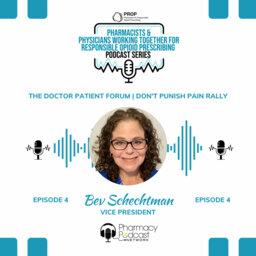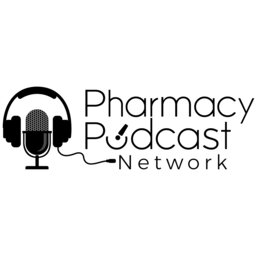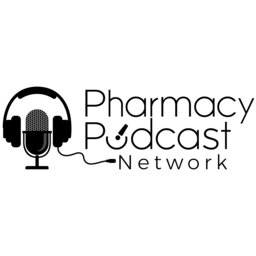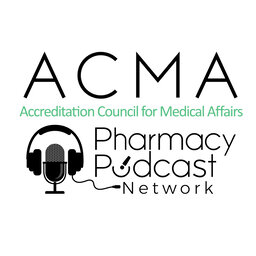V3 Medical Affairs Podcast: Special Guest Dr. Jill Massey - PPN Episode 966
ACMA Podcast
The ACMA is a member of the Pharmacy Podcast Network. The Accreditation Council for Medical Affairs (ACMA)Credible. Trustworthy. The ACMA is the on…Jill Massey is a Senior Medical Affairs Executive with proven success in leading multinational and multifunctional organizations to exceptional business results. An energetic leader recognized for expertise in strategic planning, leadership development, effective business integrations and innovative solutions. Jill combines strong business and clinical experience with nearly 30 years of experience in the pharmaceutical industry following a career in academia and clinical practice.
In this episode, Anne opens the show talking about antibiotic resistance. In our not so distant future, we could see over 10 million lives a year lost to antibiotic resistance. It’s a substantial public health challenge. Each year, 2.8 million people get an antibiotic-resistant infection. As of this recording, it was reported that 1,100 people have died in China from the Coronavirus. Anne gave kudos to the CDC, WHO and other health care organizations that helped create such a rapid and global awareness campaign about this virus, which as we know, its massive reality is still unfolding. We will cover that in an upcoming episode. However, not many people know about antibiotic resistance, despite the also massive threat.
First, Jill explains how antibiotic resistance happens. Jill says that bacteria becoming resistant to antibiotics is a natural phenomenon that occurs over time. The periods of time are shortening as bacteria get smarter. This is entirely expected with repeated exposure to antibiotics.
The two thought leaders ask the question: Where are the new and innovative antibiotics? Jill shares the industry reality regarding when we set up drug development programs, and they are targeting rare, it’s an extremely costly. Once the antibiotics get to the market, the return on investment is minimal. Large pharmaceutical companies are getting out of this business. Instead, they focus on more profitable life-saving treatments. The funding of new antibiotics is difficult to come by, and companies have stopped their development programs out of necessity.
Jill says that we need to practice reasonable infection control, like washing our hands. Then, Jill explains why generic antibiotics are ‘toxic’. Usually, they are equally effective, yet higher in adverse effects. Innovative antibiotics may have less toxicity, but costs to creating them and obtaining them are significantly more.
Later, Jill spoke out about spreading educational and health initiatives to get the word out. Any organization can participate in these needed initiatives to demonstrate what they are doing to tackle the antibiotic resistance challenge. Several organizations are measuring how pharmaceutical companies are tracking the ways they are contributing to resistance.
The number one cure to this issue is ensuring people have access to the right antibiotics. The two discuss RxER’s signature tagline that Anne trademarked and been using since 2004, stating “The right drug, for the right patient, at the right timeÔ.” If you are using inferior products, it will interfere with the microbiome and cause additional consequences. Anne says it’s essential to get the right antibiotic, and prescribe, dispense and use only when necessary and educate people on infection control. Don’t demand an antibiotic every time you have a symptom that may or may not be a bacterial infection.
Other Resources:
For medical affairs consulting, visit: https://rxercommunications.com/
For more about Anne, visit: https://annearvizu.com/
For more information about ACMA to become board certified in Medical Affairs visit: https://training.medicalaffairsspecialist.org/affiliate_page.aspx?unm=anne.aflt.arvizu
To listen to other podcasts on the Pharmacy Podcast Nation, our flagship home on the Pharmacy Podcast Network, subscribe on iTunes or visit: http://pharmacypodcast.com/
In this Episode:
- Antibiotics, the necessity for them and the resistance to them [ 1:55 ]
- Where are the new antibiotics? [ 13:30 ]
- Bringing awareness to the public [ 16:15 ]
- Generic antibiotics are toxic [ 17:50 ]
- Using educational and health initiatives to get the word out [ 19:30 ]
- How can we bring awareness and mindset to the public at large? [ 20:50 ]
- Biggest fear globally [ 25:00 ]
- Importance of infection control [ 26:21 ]
- Short-term and long-term solutions [ 30:00 ]
Quotes:
- “There is a broad spectrum of stakeholders involved in antimicrobial resistance.” -Jill Massey
- “We need education and awareness to combat fear.” -Anne Arvizu
- “Access to the right antibiotics is a global problem.” -Jill Massey
- “The lack of new antibiotics has been deemed a threat to antibiotic resistance.” -Anne Arvizu
- “Companies need the ability to fund further research and development.” -Jill Massey
- “Young children are prey to antibiotic resistance before they’ve been given an antibiotic because of food sources.” -Anne Arvizu
- “We need to bring all the stakeholders to the table together and educate them.” -Anne Arvizu
Links Mentioned:
- IDSA Patient Stories: Kenna Van Kirk: https://www.idsociety.org/public-health/patient-stories/kenna-van-kirk/
- Jill’s LinkedIn: https://www.linkedin.com/in/jill-massey-932b7a15/
- The Access to Medicine Foundation: https://accesstomedicinefoundation.org
- Melinta: https://melinta.com
- WHO World Antibiotic Awareness Week: https://www.who.int/news-room/campaigns/world-antibiotic-awareness-week/world-antibiotic-awareness-week-2019/landing
- WHO Lack of new antibiotics: https://www.who.int/news-room/detail/17-01-2020-lack-of-new-antibiotics-threatens-global-efforts-to-contain-drug-resistant-infections
- Sky News: https://news.sky.com/story/antibiotic-resistance-could-kill-us-before-climate-change-warns-countrys-top-medical-officer-11796884
- CNN: https://www.cnn.com/asia/live-news/coronavirus-outbreak-02-12-20-intl-hnk/index.html
- Drovers: https://www.drovers.com/article/antibiotic-resistance-2020-fight-fiction-facts
Please like, share and leave a comment.
In 2 playlist(s)
Pharmacy Podcast Network
The Pharmacy Podcast Network is ranked as the number one podcast in healthcare dedicated to the Busi…Social links
Follow podcast
Recent clips

Where's the Patient's Voice in Evidence-based Treatment & Research? | Pharmacist and Physician Opioid Collaborative
1:00:11

Pharmacists Answering the call | Pharmacy Podcast Nation
56:55

Ja'Miera Stuart PharmD | Brighter Horizons
19:30
 Pharmacy Podcast Network
Pharmacy Podcast Network
